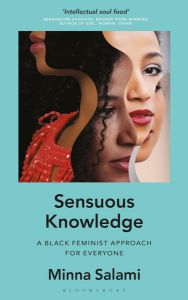 In Sensuous Knowledge: A Black Feminist Approach for Everyone, Minna Salami traces how transnational Black feminist scholarship and thought pushes against received Europatriarchal epistemologies. Academically grounded and poetically written, Lydia Ayame Hiraide finds the book an imaginative exploration of the traditions and possibilities of Black feminist knowledge production.
In Sensuous Knowledge: A Black Feminist Approach for Everyone, Minna Salami traces how transnational Black feminist scholarship and thought pushes against received Europatriarchal epistemologies. Academically grounded and poetically written, Lydia Ayame Hiraide finds the book an imaginative exploration of the traditions and possibilities of Black feminist knowledge production.
Sensuous Knowledge: A Black Feminist Approach for Everyone. Minna Salami. Bloomsbury. 2023 (paperback); 2020 (hardback).
 Sensuous Knowledge is a deeply personal and political text; one which speaks often from the first person but reaches towards broader structural questions that frame Black feminist politics across borders today and throughout history. Examining what it means to take a Black feminist approach to life and politics, Minna Salami’s text is organised into nine short and digestible chapters. Each one is named for its specific focus: knowledge, liberation, decolonisation, identity, Blackness, womanhood, sisterhood, power, and beauty. While common themes connect the chapters, it is easy to imagine any one of them forming the basis of an undergraduate or postgraduate reading list – an excellent basis on which to build meaningful classroom debate and discussion. Yet, Sensuous Knowledge clearly speaks beyond the walls of academia too: it is written beautifully, largely eschewing academese and jargonistic terms.
Sensuous Knowledge is a deeply personal and political text; one which speaks often from the first person but reaches towards broader structural questions that frame Black feminist politics across borders today and throughout history. Examining what it means to take a Black feminist approach to life and politics, Minna Salami’s text is organised into nine short and digestible chapters. Each one is named for its specific focus: knowledge, liberation, decolonisation, identity, Blackness, womanhood, sisterhood, power, and beauty. While common themes connect the chapters, it is easy to imagine any one of them forming the basis of an undergraduate or postgraduate reading list – an excellent basis on which to build meaningful classroom debate and discussion. Yet, Sensuous Knowledge clearly speaks beyond the walls of academia too: it is written beautifully, largely eschewing academese and jargonistic terms.
[Salami] reflects on how the dominance of Europatriarchal knowledge constricts our imaginations and the ways that we relate to each other and our lands, and argues for a turn towards “sensuous knowledge”
Salami coins the term “Europatriarchal knowledge” to reflect on how we produce, and are produced by, rigidly defined forms of knowledge. She reflects on how the dominance of Europatriarchal knowledge constricts our imaginations and the ways that we relate to each other and our lands, and argues for a turn towards “sensuous knowledge”. But sensuality is not sensuousness. While there is space for sensuality in sensuousness knowledge, there is a clear distinction between the two. The project to build sensuous knowledge and sensuous ways of knowing speaks to and draws directly from Audre Lorde’s work on the erotic. Lorde insists that the erotic is “is not a question only of what we do; it is a question of how acutely and fully we can feel in the doing”. Sensuous Knowledge taps into this questioning, thus reintegrating the erotic into how we know and relate to the world, rejecting the ways in which it is currently “relegated to the bedroom alone, when it is recognized at all”.
The project to build sensuous knowledge and sensuous ways of knowing speaks to and draws directly from Audre Lorde’s work on the erotic.
Building sensuous knowledge thus demands that we learn to grapple with and embrace “knowledge as a living and breathing entity rather than as a packaged product to passively consume” (15). To know sensuously is to know in a way that “infuses the mind and body with aliveness” for the purposes of “elevation and progress rather than out of an appetite for power” (150). Sensuous knowledge thus makes space for explorations that flow from the body, from spiritual spaces, and, importantly, in partnership with community. It makes space for that which creates joy and pleasure. In many ways, Sensuous Knowledge brings forth a Black feminist politics of pleasure, without disregarding the realities of individual and collective trauma and pain. Sensuous knowledge is built on a holistic, not Cartesian, politics. Such a politics is equipped to address the complex ways in which power shapes psyche, body, and community.
Engaging critically with the insights of a broad range of thinkers and artists – from Lauryn Hill to Fela Kuti to Charlie Chaplin, Audre Lorde, bell hooks, Socrates, to name a few – Salami takes a multidisciplinary and multimedia approach to knowledge building.
What is most striking about Sensuous Knowledge is its ability to meaningfully engage with and honour creativity. The book carefully weaves in music, storytelling, and art throughout, evoking these different mediums so vividly that you can almost hear the voices and see the faces of each person invited into the richly textured conversation. Engaging critically with the insights of a broad range of thinkers and artists – from Lauryn Hill to Fela Kuti to Charlie Chaplin, Audre Lorde, bell hooks, Socrates, to name a few – Salami takes a multidisciplinary and multimedia approach to knowledge building. If citations are feminist bricks, Salami uses hers to build an impressive and eclectic feminist shelter from which to catalogue and enjoy all the different ways of knowing that the academy has often spurned.
Salami’s work centres relationality, as she thinks through what it means to build sisterhood both literally and metaphorically.
The text itself is deeply sensuous. It is written poetically, invoking luscious imagery with a rich use of metaphor, and drawing on storytelling traditions with equal measures of respect and creativity. Moreover, it makes vital use of African storytelling traditions throughout, reminding us of the potency of stories. As Indigenous scholarship reminds us, stories can provide teachings, warnings, and provoke questions. In many ways, this text evokes Indigenous scholarship that is based on both storytelling and a strong centring of relationality (literally how we relate to each other and the world). If we are Black, women, and working class by way of relation (and not essence) then it is also relevant to note that we are daughters and sisters and friends too. Salami’s work centres relationality, as she thinks through what it means to build sisterhood both literally and metaphorically. Such reflection requires a careful navigation of issues of essentialism and, at moments, the book teeters towards making essentialist claims, though it acknowledges the issues and challenges of doing so.
The text is in dialogue with the important contributions of African American Black feminists. But it does not get trapped in a kind of regionally bound myopia which refuses to see beyond the shores of Turtle Island (or the borders of the lands we call the USA)
Overall, Salami’s Sensuous Knowledge can be read as an ode to Black feminism and a contribution to the Black feminist tradition of knowledge building in its own right, with a refreshing take on Black feminist thought from a deeply transnational perspective. The text is in dialogue with the important contributions of African American Black feminists. But it does not get trapped in a kind of regionally bound myopia which refuses to see beyond the shores of Turtle Island (or the borders of the lands we call the USA). The author’s own transnational experiences and mixed cultural background likely inform this refreshing cosmopolitan approach (Salami is Nigerian-Finnish-Swedish and her blog is titled MsAfropolitan). Her argument for sensuous knowledge is also grounded in the view that Black feminism is enrichened by taking an African-centric approach which is also able to engage with the diasporic nature of Blackness. This diaspora reaches into Europe, across Turtle Island and moves beyond. Hence, the text shows a remarkable ability to hold complexity and contradiction; to think in ways that embrace simultaneity. Its analysis is marked by a both/and mindset, rejecting the binary of either/or. How can we build and encourage a Black feminist politics that is capable of addressing several issues, lands, and communities at once? This is what Sensuous Knowledge asks, without dictating a definitive answer to the reader.
How can we build and encourage a Black feminist politics that is capable of addressing several issues, lands, and communities at once?
Without a doubt, Sensuous Knowledge is an impressive work which embraces a wide range of intellectual traditions across widespread geographies. It demonstrates serious engagement with intellectual and political giants in a way that is largely accessible. Not only does this book define and explore sensuous knowledge; it practices it too. By making simultaneous use of knowledge that is deeply personal, experiential, traditional, and bookish, Sensuous Knowledge breaks academic conventions and asserts the diversity of ways of knowing that colour an abundantly diverse and textured world.
- This review first appeared at LSE Review of Books.
- Image Credit: Cincinart on Shutterstock
- Please read our comments policy before commenting.
- Note: This article gives the views of the reviewer, and not the position of USAPP – American Politics and Policy, nor of the London School of Economics.
- Shortened URL for this post: https://bit.ly/46onZ12






